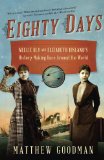Summary | Excerpt | Reading Guide | Reviews | Beyond the Book | Readalikes | Genres & Themes | Author Bio
Nellie Bly and Elizabeth Bisland's History-Making Race Around the World

Critics' Opinion:
Readers' Opinion:
First Published:
Feb 2013, 480 pages
Paperback:
Mar 2014, 496 pages
 Book Reviewed by:
Book Reviewed by:
BookBrowse First Impression Reviewers
Buy This Book
The very next afternoon the writer herself unexpectedly arrived at the Dispatch office. She was twenty years old but looked even younger; Erasmus Wilson would recall her from that morning as "a shy little girl." She was slimly built, of medium height, with large, somewhat mournful-looking gray eyes and a broad mouth above a square-set chin. She wore a long black cloak and a simple fur hat; her hair, which she had not yet taken to wearing up, fell in auburn curls around the shoulders of her coat. The young woman was plainly uncomfortable in her surroundings, intimidated by her first visit to a city newsroom. In a voice that barely rose above a whisper, she asked an office boy where she might find the editor.
"That is the gentleman," the boy said, and he pointed toward Madden sitting a few feet away.
Seeing the dapperly mustached young editor, she broke into a smile, revealing a physical detail often remarked upon by those who met her: a dazzlingly white set of teeth. "Oh, is it?" she exclaimed. "I expected to see an old, cross man."
George Madden told her that he was not going to print her letter; instead, he said, he wanted her to write an article of her own on the question of "the woman's sphere." Neither Bly nor Madden ever recorded her immediate reaction to his request, but the prospect of actually writing for a newspaper, after four years of tramping Pittsburgh's soot-darkened streets in pursuit of menial work with little hope of ever finding anything better, must have meant everything to her; within the week she had turned the article in to Madden. Her grammar was rough, her punctuation erratic (for years George Madden was heard to complain about the amount of blue pencil he had expended on her pieces), but the writing was forceful and her voice clear and strong. She had chosen to address the question from the perspective of those women who did not have the privileges "Q. O." had summarily granted them: poor women who needed to work to support their families. It was an impassioned plea for understanding and sympathy, into which she must have poured some of her own despair at the conditions of her life and that of her mother:
Can they that have full and plenty of this world's goods realize what it is to be a poor working woman, abiding in one or two bare rooms, without fire enough to keep warm, while her threadbare clothes refuse to protect her from the wind and cold, and denying herself the necessary food that her little ones may not go hungry; fearing the landlord's frown and threat to cast her out and sell what little she has, begging for employment of any kind that she may earn enough to pay for the bare rooms she calls home, no one to speak kindly to or encourage her, nothing to make life worth the living?
So Elizabeth Cochrane came to be hired as a reporter for the Dispatch, at a salary of five dollars a week. Before her next article was published (this one on divorced women, another subject close to her heart), George Madden called her into his office and informed her that she needed a pen name. At the time, it was considered uncouth for a woman to sign her own name to a news story. The Dispatch's own Elizabeth Wilkinson Wade wrote as "Bessie Bramble"; in New York, Sara Payson Willis was "Fanny Fern"; in Boston, Sally Joy (which itself sounded like a pen name) was known instead as "Penelope Penfeather." He was looking for a name, George Madden said, that was "neat and catchy." Together the two considered several possibilities, but none seemed quite right. It was late in the afternoon; the light from the gas lamps cast flickering shadows on the wallpaper. From upstairs an editor called for his copy. An office boy walked by whistling a popular tune of the day, written by the local songwriter Stephen Foster:
Nelly Bly! Nelly Bly! Bring de broom along,
We'll sweep de kitchen clean, my dear,
And hab a little song.
The name was short, it was catchy, and best of all, the public already liked it. Madden instructed the typesetter to give the story the byline "Nelly Bly"—but the typesetter misspelled the first name, and as a result of the erratum she was forever after Nellie Bly.
Excerpted from Eighty Days by Matthew Goodman. Copyright © 2013 by Matthew Goodman. Excerpted by permission of Ballantine Books, a division of Random House, Inc. All rights reserved. No part of this excerpt may be reproduced or reprinted without permission in writing from the publisher.





The House on Biscayne Bay
by Chanel Cleeton
As death stalks a gothic mansion in Miami, the lives of two women intertwine as the past and present collide.

The Flower Sisters
by Michelle Collins Anderson
From the new Fannie Flagg of the Ozarks, a richly-woven story of family, forgiveness, and reinvention.

The Funeral Cryer by Wenyan Lu
Debut novelist Wenyan Lu brings us this witty yet profound story about one woman's midlife reawakening in contemporary rural China.
Your guide toexceptional books
BookBrowse seeks out and recommends the best in contemporary fiction and nonfiction—books that not only engage and entertain but also deepen our understanding of ourselves and the world around us.